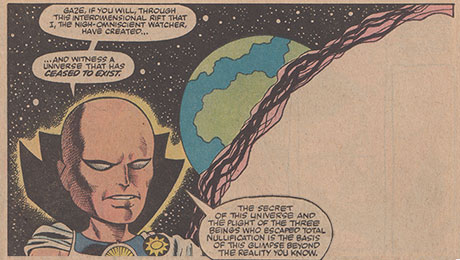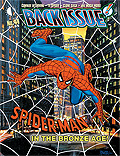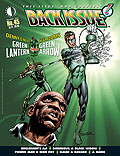
Karen: Let's talk about one of the staples of super-hero comics: the secret identity. How necessary is it? For some characters, that civilian ID is completely necessary, as important as their hero ID. This is certainly true for characters like Spider-Man, whose life as Peter Parker was in many ways even more involving than his heroic exploits. Certainly you could not disengage the two identities. Peter IS Peter; even when wearing that red and blue (or black!) costume, he remains Peter.
 It's pretty much impossible to conceive of one without the other.
It's pretty much impossible to conceive of one without the other.Karen: On the other hand, I think a character like Thor has no need of a secret ID. The Don Blake character was ultimately revealed to be a false person, a mortal cloak to throw over Thor. While the book might have started out with a premise similar to the original Captain Marvel, with a weak mortal transformed into a powerful, god-like hero, Thor steered away from Don Blake so much by the early 70s that he was no longer important to the title.
Karen: There are some characters who have secret IDs but one wonders, why? I'd throw Captain America into this category. Since Cap has only rarely developed a life outside of super-heroing, hiding his Steve Rogers ID seems unnecessary. What about Iron Man? The Iron Man movie makes a pretty good case for discarding the whole secret ID thing.
Doug: How about the Fantastic Four? Talk about no need for a secret ID. And when you think about them, they are synonymous with their "code names". And really -- after awhile is there really any drama in stories where some girlfriend or boyfriend is constantly trying to uncover their love's alter ego? How dense must Lois Lane have been??
Karen: Sometimes we wonder which identity is the 'true' identity. You could debate the Superman/Clark Kent question til the cows come home. Personally, I think he's like Spider-Man -he's always Clark, just not a stumbling, fumbling Clark. He's always the small town boy with a strong sense of right and wrong.
Karen: Batman's a whole different proposition. He needs his Bruce Wayne identity to fund his activities, but who is the real person? I tend to think his Batman persona dominates.
Karen: So let's talk secret identities - who needs one, who doesn't, and who is the real person?


















































10 comments:
Personally, I don't think Bruce Wayne or Batman is the "real" personality. He's real during that in-between time when he's in costume with the mask off talking to Alfred or Robin in the Batcave.
Karen and Doug- You pretty much nailed it with the characters you mentioned. Spiderman is just Peter Parker with red and blue tights; while the Batman would stalk the city 24/7 until he dropped, if he could.
A few thoughts:
Daredevil has had a long history of trouble with his identities. It's tough to say which he's more comfortable in, but he does need his Matt Murdock id to maintain his professional services.
Bruce Banner would rid himself of his alter ego if he could; but of course that duality is the whole point of his story.
A final observation; many villians also maintain secret id's but this seems seldom an issue. One exception to this could be the Green Goblin, as Norman Osborn's role out of costume is as important as within it.
Secret IDs seem less of an issue in contemporary comics, Iron Man being a good example.
In the Bronze Age comics he jealously guarded the the secret that he really was Tony Stark even from his fellow Avengers. But in the movie and in the animated series Tony Stark openly is both.
I guess to today's creators secret IDs seem antiquated in the world of Facebook, Twitter and other social media which seemed designed to create maximum public exposure.
... I, on the other hand, appreciate a little anonymity ...
Let's see, where to begin.
Bruce Wayne differs depending on who writes him. In Batman the animated show, Bruce Wayne was as important as the Batman identity. As the silly playboy, Bruce Wayne, he would move around a lot getting valuable info and insight that would either lead to or solve cases. In fact, in one show where he was kidnapped with many homeless men and brought to the desert, his Batman persona was only on for a few minutes of the whole show; i.e. he made a token appearance.
Now Moon Knight is a whole other ball game with his 3 or 4 identities. Unfortunately he hasn't ever really been written very well and so we can't really know where that will go.
The whole idea of dressing up in long underwear is so absurd to begin with, I mean, by dressing up in brightly colored, form fitting clothes, they are only making themselves MORE conspicuous, and a bigger target to the bad guys! Even Batman with his dark blue clothes, or sleek Batmobile would stick out in a crowd. How are you going to prowl for bad guys when everyone is starring at you?
I think as time goes on we'll see creators make this idea more practical in a real world sense and do away with the costumes in many cases.
The clue is how robust 'the circle' is to the respective identity. PP has an incredible supporting cast, but Spider-Man is a loner and hardly hangs out with a soul.
Same with Superman. Sure, he hangs out with Justice Leaguers, but that always seems like a LinkedIn network. His friends are friends of Clark. It becomes very clear when you flip through the Superboy stories--big support cast with SB a loner.
With Cap, he doesn't have a life outside the costume. Nor, really, did Thor.
As far as Captain America is concerned, one thing I really liked about the all-too-brief Stern & Byrne run was that they did a nice job of laying the groundwork for Steve Rogers having a life and a rather 'normal' circle of friends outside of his costumed identity. I also liked how they emphasized that Steve had other, more mundane interests (art and becoming a commercial artist) outside of being a hero. I think DeMatteis at least initially did a good job of keeping up this aspect of Cap's life.
Another note on the supporting cast defining the character-- perhaps the most egregious example is Wonder Woman, who really doesn't have much going on in either identity--friends, professionals, Rogues Gallery.
I personally think that, in most cases, the "secret identity" is as essential to the super hero genre as powers and costumes are. I really don't think the whole concept of the comic book "super hero" would have been as successful without the addition of the alter ego aspect.
If you really think about it, one of the things that is most appealing about Spider-Man and Batman, etc. is the idea that nobody knows that they are secretly a badass. This same formula was also used very successfully in shows like the "Six Million Dollar Man", as well as in Bruce Lee movies, etc.. Wherein you get the hero into a situation where they are outnumbered and outgunned, and the audience is thinking "Oh man, these guys don't know who they're messing with. They're in trouble now."
This feeds greatly into the concept of "wish fulfillment". Wherein the audience member (usually an adolescent male) can imagine themselves in the roll of the hero. A person with a "secret ability" that makes them special. Be it a bionic arm, spider powers, a utility belt, or being a kung-fu master. The secret identity is essential to this fantasy, otherwise the observer can't imagine that they secretly are special as well.
Critics say that modern audiences are too sophisticated for the idea of grown men (or women) running around with secret identities in gaudy costumes fighting crime. I'd argue that anyone who suggests that getting rid of the costumes and secret I.D.s in super hero comics is a good idea, never really liked super heroes in the first place. People haven't changed that much in hundreds of years, and the idea of secretly being a super hero and having special abilities that no one else knows about, is as appealing to people today as it has ever been.
On a side note, it really ticks me off when creators do decide to reveal a characters secret I.D., but the hero stills runs around wearing a MASK, like Captain America for example, or when they did it with Spider-Man and The Flash (Wally West). Why the heck would you continue to wear an uncomfortable, vision impairing mask when everyone already knows who you are anyway? Stupid!
This is a topic that was recently on my mind. I've been watching alot of Avengers:Earth's Mightiest Heroes cartoons, and the use of real names (ie. Clint...) during battles just sticks out. i can understand it when they're in the Mansion, but not in public. As it has been stated in the previous comments here: Why bother with the masks is your teammates are just gonna call out your real name in public, anyway? Maybe it's a slip-up in scripting, but i would hope editing would be better.
Post a Comment